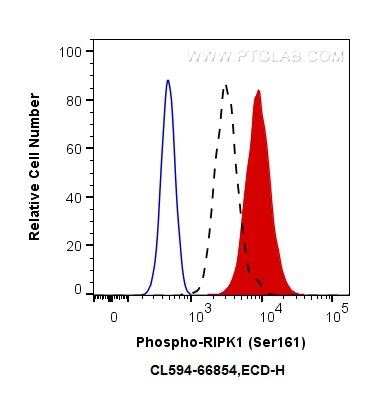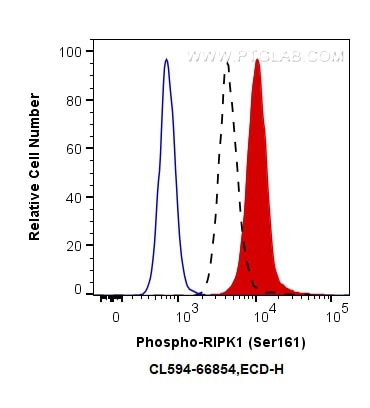Anticorps Monoclonal anti-Phospho-RIPK1 (Ser161)
Phospho-RIPK1 (Ser161) Monoclonal Antibody for FC (Intra)
Hôte / Isotype
Mouse / IgG1
Réactivité testée
Humain
Applications
FC (Intra)
Conjugaison
CoraLite®594 Fluorescent Dye
CloneNo.
1B2G1
N° de cat : CL594-66854
Synonymes
Galerie de données de validation
Applications testées
| Résultats positifs en cytométrie | cellules HEK-293T traitées à la calyculine A, cellules PC-3 traitées à la calyculine A |
Dilution recommandée
| Application | Dilution |
|---|---|
| Flow Cytometry (FC) | FC : 0.13 ug per 10^6 cells in a 100 µl suspension |
| It is recommended that this reagent should be titrated in each testing system to obtain optimal results. | |
| Sample-dependent, check data in validation data gallery | |
Informations sur le produit
CL594-66854 cible Phospho-RIPK1 (Ser161) dans les applications de FC (Intra) et montre une réactivité avec des échantillons Humain
| Réactivité | Humain |
| Hôte / Isotype | Mouse / IgG1 |
| Clonalité | Monoclonal |
| Type | Anticorps |
| Immunogène | Peptide |
| Nom complet | receptor (TNFRSF)-interacting serine-threonine kinase 1 |
| Masse moléculaire calculée | 76 kDa |
| Poids moléculaire observé | 74 kDa, 45 kDa |
| Numéro d’acquisition GenBank | NM_003804 |
| Symbole du gène | RIPK1 |
| Identification du gène (NCBI) | 8737 |
| Conjugaison | CoraLite®594 Fluorescent Dye |
| Excitation/Emission maxima wavelengths | 588 nm / 604 nm |
| Forme | Liquide |
| Méthode de purification | Purification par protéine G |
| Tampon de stockage | PBS avec glycérol à 50 %, Proclin300 à 0,05 % et BSA à 0,5 %, pH 7,3. |
| Conditions de stockage | Stocker à -20 °C. Éviter toute exposition à la lumière. Stable pendant un an après l'expédition. L'aliquotage n'est pas nécessaire pour le stockage à -20oC Les 20ul contiennent 0,1% de BSA. |
Informations générales
RIPK1(Receptor-interacting serine/threonine-protein kinase 1) is primarily involved in mediating TNF-R1-induced cell activation, apoptosis and necroptosis and belongs to a novel class of kinases thatfunction in cell survival and cell death mechanisms(PMID:22685397 ).It has 2 isoforms produced by alternative splicing.It also can exist as the protein with lower molecular weight about 25 kDa and 45 kDa in HAEC and HUVEC (PMID: 22685397).



